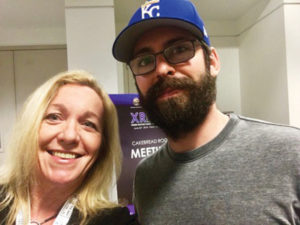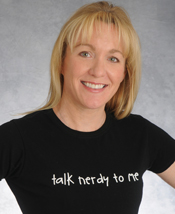A Summertime Reality Roundup
By Leslie Ellis
It’s the dawn of another searing summer day here in Colorado, so it seemed only natural to start this second installment of Nerdy Little Secrets with the hottest thing that’s happened for me so far this season: Martin Starr, who plays Bertram Gilfoyle, on HBO’s Silicon Valley. As in meeting him (what!), and getting to ask him a few nerdy questions (and yes, I’m going to make you wait until the end for that.)
It happened, not coincidentally, in San Jose, Calif. — the geographical center of Silicon Valley — in late June, at an event hosted by Cisco and the Advanced Imaging Society called “XR on the Bay,” where “XR” is a catch-all category spanning augmented reality, virtual reality, and artificial intelligence. The reasoning went like this: If technology empowers artists, and artists empower technology, why not start blending those two cultures?
Attendees were tech people representing both northern and southern California — the Valley, and Hollywood. (On the walk into Cisco’s “Building Number 9,” for instance, I got lost briefly with a guy who does digital rendering for Pixar.)
Now: If you, like me, had already summarily dismissed the VR scene (just as you did 3D), because who wants to engage in something that requires putting something on your head that covers your eyes and your ears, pull up. Pretty sure there’s a there there. Especially with AR.
The first thing to blow my mind happened in the first keynote, when Jonathan Miranda, director of strategy and technology for Salesforce.com, explained a project his team is working on, with DARPA, to map out a cubic millimeter of a human brain — with an estimated time to completion of seventeen years. (Keep that one handy for people who fret that robots are going to eliminate their jobs.)
While much of the day focused on the goodness VR, AR and AI can bring to storytelling — movies, TV shows, shorts — the most compelling evidence involved brain-computer interfaces that improve day-to-day life. Salesforce.com’s Miranda, for instance, related an anecdote from his own life: His two sons, ages seven and nine, are autistic. At their school, they wear Google Glass eyewear; the camera on the glasses can immediately identify a classmate by name — and emotional state. Someone falls on the playground. Is she laughing, or is she hurt? He called it life changing. (If of interest, check out the AutismGlass Project.)
Another speaker, Tipatat Chennavasin, GM and co-founder of The VR Fund, said that his investment philosophy is to look for things that are solving something with no known solution. Like people with amblyopia, also known as lazy eye: As a child, exercises can be about 40% effective, but once you’re an adult, it’s permanent. That’s what piqued his interest in a company called Vivid Vision. It’s a game, in VR, that trains the eyes — and is 60% effective for both young and old.
Or how about this: You’re in a noisy restaurant, and as a direct result, you can’t hear the people you’re with. So you pop in the ear buds, open a companion app, and tell it to both remove the noise around you, and raise the volume on human speech.
So much more: Location-based entertainment; volumetric capture; deep learning. Immersion learning at its finest, and punctuated by (the aforementioned) Q&A with Martin Starr, who plays the deliciously sarcastic Gilfoyle on Silicon Valley. Friends had asked me to find out if he’s really a tech person. He said this: “Mostly it goes over my head. I have no connectivity tissue in my life for it; I’m still at a very base-level relationship with technology. A lot of it I learn and understand … for 30 minutes, and then forget it. For the rest of my life.” (I asked him what would trigger his “bitcoin noise,” if he were able to rig such a cacophony in his real life. His answer: “I keep my phone on silent most of the time.”)
That’s a short recap of a full day of impressively nerdy tech-talk. I’m still waiting for AR/VR that doesn’t require headgear, but I’m no longer as skeptical.

Leslie Ellis with Martin Starr, who plays Bertram Gilfoyle, on HBO’s Silicon Valley at the XR on the Bay conference in San Jose, Calif.
 Leslie Ellis,
Leslie Ellis,
President, Ellis Edits Inc.
leslie@ellisedits.com
Leslie Ellis is a tech writer focused on explaining complex engineering stuff for people who have less of a natural interest than engineers. She’s perhaps best known (until now!) for her long-running weekly column in Multichannel News called “Translation Please.” She’s also written two broadband dictionaries, one field guide to broadband, and is co-author of “Planet Broadband” with Roger Brown and Stewart Schley. She’s served as Senior Technology Advisor to CTAM since 2001, and is a behind-the-scenes tech translator for domestic and global service providers, networks, and suppliers.
Shutterstock




